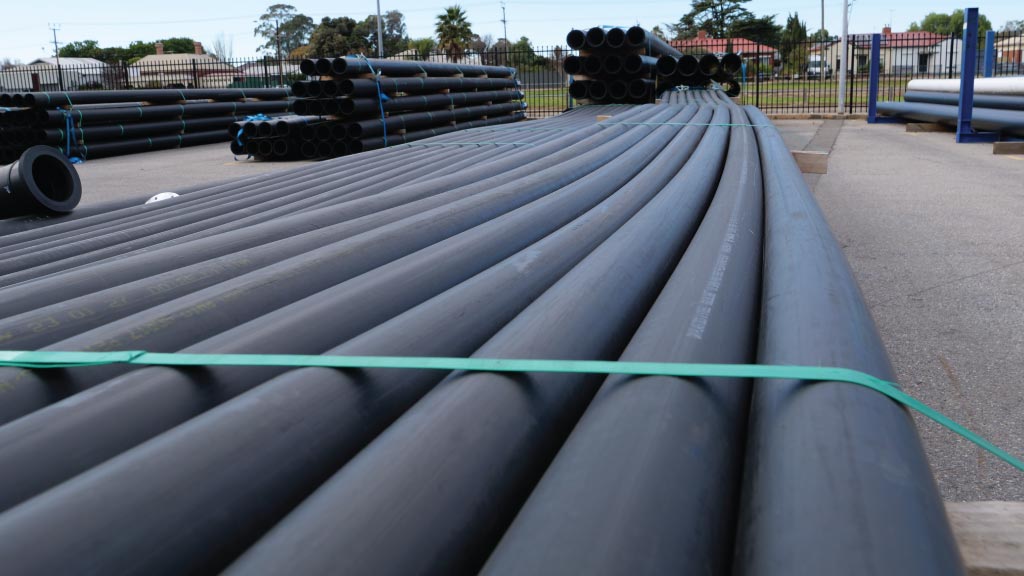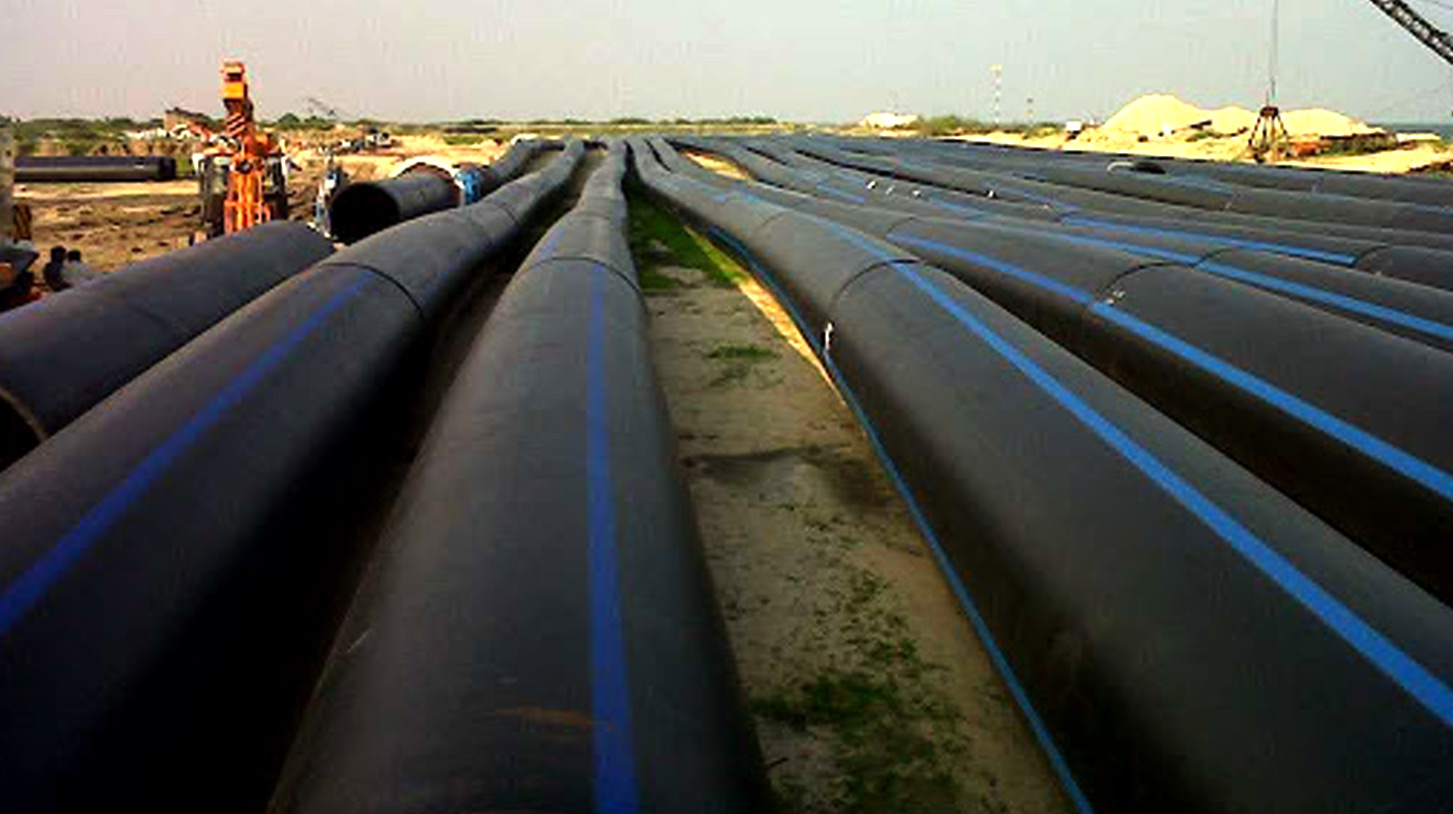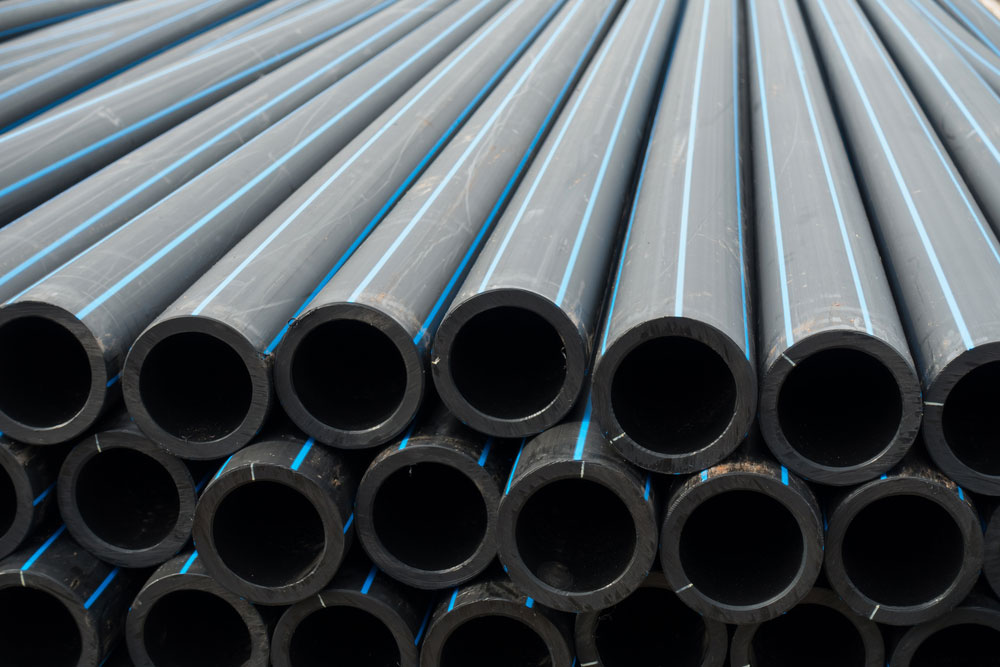Checking Out the Leading Pipeline Manufacturers: Quality, Dependability, and Innovation
The pipeline manufacturing market stands at the intersection of integrity, quality, and advancement, driven by leading companies such as Tenaris and Vallourec. These manufacturers are not only dedicated to creating high-performance materials however are likewise introducing sustainable practices that resolve modern ecological issues (HDPE Pipe Supplier). As we analyze the criteria that specify quality in pipeline services, it becomes obvious that the landscape is quickly advancing. What certain technologies are arising, and how are these advancements shaping the future of pipeline framework? The responses may redefine sector criteria in manner ins which are not yet fully recognized
Leading Manufacturers Overview
In the domain name of pipeline manufacturing, numerous principals become leaders, each contributing considerably to the market's landscape. Firms such as Tenaris, Vallourec, and JFE Steel have developed themselves as frontrunners by regularly delivering top quality products that fulfill rigorous industry requirements. Tenaris, renowned for its ingenious solutions, concentrates on smooth and welded pipes, catering primarily to the oil and gas field. Vallourec, a French international, focuses on the manufacturing of premium tubular options, highlighting sustainability and progressed technology in its manufacturing processes.
Likewise, JFE Steel, a significant Japanese manufacturer, is identified for its substantial variety of steel pipelines, particularly those utilized in power and infrastructure jobs. Their commitment to r & d has enabled them to produce high-performance materials that stand up to extreme ecological conditions. In addition, business like united state Steel and National Oilwell Varco have increased their market presence by diversifying their product offerings and improving operational effectiveness.
These leading producers not only control the marketplace yet additionally drive development within the industry, establishing standards for high quality and reliability that various other gamers desire attain. Their contributions are vital for satisfying the boosting need for durable and reliable pipeline options worldwide.
Requirements for Quality Assessment
Quality analysis in pipeline manufacturing hinges on 2 vital requirements: product durability criteria and making procedure performance. Ensuring that materials satisfy strenuous durability benchmarks is essential for the durability and reliability of pipes. In addition, optimizing the manufacturing process can improve efficiency while preserving excellent quality, eventually impacting general efficiency and security.
Material Resilience Requirements
Assuring the long life and reliability of pipeline products is essential for preserving facilities integrity and functional effectiveness. Material durability requirements play an important function in assessing the quality of pipelines, dictating the efficiency and life-span of the materials used in building. Manufacturers should comply with a variety of strenuous requirements, including those established by companies such as ASTM International and the American Petroleum Institute (API)
These criteria review different aspects, including deterioration resistance, tensile stamina, and tiredness efficiency. Pipelines used in destructive settings call for products that can hold up against chemical degradation, while those subjected to high-pressure conditions need to exhibit outstanding tensile toughness.
Additionally, variables such as temperature level fluctuations and environmental problems should be considered, as these can considerably affect material behavior in time. Manufacturers usually use advanced testing techniques, including sped up aging examinations, to replicate long-term wear and assurance that products go beyond or satisfy industry criteria.
Manufacturing Process Performance
Manufacturers' ability to enhance manufacturing procedure performance is vital for producing high-quality pipes that satisfy rigorous sector requirements. Performance in manufacturing straight influences price management, production timelines, and overall item honesty. To attain this, leading pipeline manufacturers implement innovative strategies such as lean manufacturing, automation, and real-time information analytics.
Lean producing concepts are crucial in lessening waste and optimizing resource usage. By improving processes and removing redundancies, suppliers can boost efficiency while making certain constant top quality. Automation technologies, consisting of robotics and computer system mathematical control (CNC) equipments, play a pivotal role in enhancing precision and decreasing human mistake, therefore raising the reliability of the last product.
Additionally, using real-time data analytics allows producers to monitor manufacturing procedures continually, enabling them to recognize bottlenecks and make prompt changes. This positive strategy not just boosts performance but also sustains high quality guarantee procedures by guaranteeing compliance with regulatory requirements.
Integrity in Pipeline Solutions
Integrity in pipeline options is critical, as it straight affects the safety and performance of liquid transport systems. Key elements consist of the toughness of materials used, adherence to strenuous screening and certification criteria, and the unification of cutting-edge material solutions that enhance efficiency. Understanding these components is necessary for suppliers aiming to supply trustworthy pipeline infrastructure.
Relevance of Sturdiness
Achieving sturdiness in pipeline options is crucial, as it directly affects the lasting performance and safety and security of framework. Resilient pipes are necessary for minimizing maintenance prices and reducing the likelihood of disastrous failings. This integrity is particularly crucial in industries such as oil and gas, water supply, and wastewater management, where the effects of pipeline failure can be extreme, both financially and ecologically.
The materials and manufacturing procedures employed by pipeline suppliers play a substantial duty in identifying the sturdiness of the end product. Making use of top notch resources, progressed technologies, and ingenious style principles guarantees that pipelines can endure numerous stressors, including pressure fluctuations, temperature level variants, and harsh settings.
The longevity of pipelines is closely linked to their capacity to withstand exterior factors such as soil movement, seismic activity, and chemical exposures. Efficient corrosion security methods, such as layers and cathodic security, additionally boost the durability of pipelines, protecting them against degeneration with time.
Investing in sturdy pipeline options eventually equates to increased operational performance, minimized downtime, and improved safety, verifying the critical significance of longevity in contemporary pipeline manufacturing.
Examining and Certification Specifications
In the domain of pipeline options, rigorous screening and accreditation standards are important to guarantee the integrity and security of infrastructure. These requirements work as criteria for reviewing the performance and longevity of pipeline products and systems, validating they meet particular regulative and sector requirements.
Evaluating processes commonly encompass different techniques, including stress testing, hydrostatic assessments, and non-destructive testing strategies. These assessments are vital for identifying potential weaknesses or defects in the products before they are released in real-world applications. Additionally, qualification by identified organizations assurances that suppliers comply with developed guidelines, which promotes trust fund amongst stakeholders, consisting of end-users, service providers, and designers.
Many top pipeline makers engage in continuous monitoring and renovation of their testing protocols to adapt to evolving market criteria and technological improvements. Compliance with requirements such as ASTM, ASME, and ISO not just improves item integrity yet additionally decreases the danger of ecological incidents connected with pipeline failures.
Ingenious Material Solutions
The growth of cutting-edge product services has transformed the landscape of pipeline manufacturing, improving both performance and longevity. Advanced materials such as high-density polyethylene (HDPE), cross-linked polyethylene (PEX), and composite materials have emerged as game-changers, offering remarkable resistance to deterioration, temperature level fluctuations, and stress variants. These products not only extend the life expectancy of pipes yet additionally reduce maintenance prices, guaranteeing dependable long-lasting efficiency.
Manufacturers are significantly adopting clever materials that incorporate sensors for real-time tracking. This innovation permits proactive maintenance, considerably boosting integrity by spotting leakages or architectural weak points prior to they escalate into critical failures. The integration of nanotechnology has actually additionally caused the development of coatings that improve the durability of pipelines versus abrasion and chemical direct exposure.
Sustainability is one more crucial emphasis, with suppliers checking out bio-based compounds and recyclable materials that reduce environmental effect. As governing criteria continue to advance, the emphasis on ingenious product solutions comes to be paramount in conference rigid security and ecological needs. Eventually, these improvements not only boost the reliability of pipeline systems but also add to the general efficiency and sustainability of power transport infrastructures.
Innovations in Pipeline Technology
Technologies in pipeline modern technology are transforming the market by improving effectiveness, safety, and ecological sustainability. Recent innovations concentrate on clever pipeline systems that make use of sensors and IoT technology to keep track of problems in genuine time, enabling aggressive maintenance and lowering the danger of failures. These systems can find leakages, pressure changes, and various other anomalies, permitting for quick reaction and lessening environmental effect.
In addition, the growth of advanced materials, such as composite and corrosion-resistant alloys, substantially extends the life-span and dependability of pipelines. Pipeline Manufacturer (American Plastics LLC HDPE Pipe Solutions). These materials lower upkeep expenses and improve efficiency in extreme atmospheres, making them perfect for oil, gas, and water transport
Automation and robotics are playing an essential role in pipeline construction and assessment. Drones and robotic tools assist in studies and evaluations of hard-to-reach locations, making sure detailed inspections without jeopardizing safety.
Furthermore, innovative layouts, such as modular pipeline systems, allow for greater versatility in installment and alteration, accommodating the dynamic requirements of the power field. With each other, these technological innovations not just enhance operational efficiency but likewise add to an extra lasting and durable pipeline infrastructure, paving the means for a greener future.
Situation Research Studies of Success
Across numerous markets, successful applications of innovative pipeline innovations show considerable enhancements in operational effectiveness and security. One notable case is the implementation of wise pipeline monitoring systems in the oil and gas industry, where real-time information analytics have decreased leak discovery times by over 50%. This not just minimizes ecological risks however also enhances the overall honesty of pipeline framework.

Additionally, a significant manufacturer applied robotic inspection innovations in its pipeline upkeep operations, causing a 40% enhancement in inspection effectiveness. This strategy has streamlined upkeep schedules and considerably lowered downtime.
These study highlight exactly how top pipeline producers are leveraging advanced technologies to cultivate dependability and functional quality, ultimately setting brand-new standards for the industry. As these successes proceed to unfold, they pave the means for additional developments in pipeline manufacturing and monitoring.

Ecological Sustainability Practices
Frequently, pipeline makers are prioritizing environmental sustainability methods to alleviate their ecological footprint and boost the long life of their products. This commitment is reflected in numerous campaigns focused on lowering waste, conserving energy, and utilizing lasting products throughout the manufacturing process.

Numerous makers are embracing advanced modern technologies that decrease emissions and energy intake. As an example, the integration of automated systems and energy-efficient machinery aids simplify manufacturing while lowering reliance on nonrenewable fuel sources. Furthermore, firms are progressively turning to environment-friendly products, such as recycled metals and bioplastics, which not only reduce the environmental impact yet also advertise a round economy.
Furthermore, pipeline makers are carrying out strenuous lifecycle assessments to evaluate the ecological ramifications of their products from inception to disposal. This method allows them to determine opportunities for renovation and foster accountable sourcing and waste management techniques.
Collaboration with ecological organizations better improves these initiatives, as manufacturers look for to align their procedures with global sustainability objectives. Ultimately, these ecological sustainability techniques not only add to a healthier earth however also setting manufacturers as accountable leaders in the industry, attracting environmentally mindful stakeholders and consumers alike.
Future Trends in Pipeline Manufacturing
As the need for more lasting and effective framework grows, pipeline manufacturing is poised for substantial innovations that will certainly improve the sector. Trick fads prepared for in the coming years consist of the integration of sophisticated materials, such as corrosion-resistant and composite alloys, which boost sturdiness while minimizing ecological influence. Manufacturers are also anticipated to take on cutting-edge production methods, like additive manufacturing and automation, to simplify procedures, reduce waste, and lower expenses.
In addition, the surge of smart pipeline technologies, integrating sensors and IoT gadgets, will certainly allow real-time surveillance and anticipating upkeep, thus improving security and functional effectiveness. This electronic makeover will certainly not just maximize source administration yet likewise assist in conformity with strict environmental laws.
Sustainability will stay a central focus, driving manufacturers to buy environment-friendly methods, consisting of energy-efficient manufacturing techniques and recycling initiatives. As the global focus on environment modification escalates, pipeline suppliers will require to adjust by establishing services that meet both financial and ecological needs.
Frequently Asked Inquiries

What Industries Primarily Make Use Of Pipeline Products From These Manufacturers?
Pipeline products are mostly utilized in markets such as oil and gas, wastewater and water administration, chemical building and construction, handling, and mining. These fields depend on effective, durable, and secure transportation of products and liquids.
Exactly How Do Manufacturers Ensure Conformity With International Pipeline Specifications?
Manufacturers ensure compliance with worldwide pipeline requirements by executing extensive top quality control procedures, performing normal inspections, adhering to recognized governing structures, and purchasing staff member training to advertise recognition and understanding of safety and quality requirements.
What Is the Average Lifespan of Pipelines From Leading Manufacturers?
The average lifespan of pipelines from leading manufacturers generally ranges from 30 to 100 years, depending on product, ecological problems, and upkeep techniques. American Plastics LLC HDPE Pipeline Manufacturer. Normal examinations and adherence to sector requirements noticeably affect long life and American Plastics LLC HDPE Pipeline Manufacturer efficiency
Are There Certifications Specific to Pipeline Production Top Quality?
Yes, different certifications exist for pipeline making top quality, consisting of ISO 9001 for quality monitoring systems and API requirements specific to pipes. These accreditations guarantee adherence to strenuous security, efficiency, and ecological requirements within the sector.
Exactly How Do Manufacturers Handle Pipeline Upkeep and Repair Works?
Manufacturers generally apply a positive upkeep method that includes routine inspections, monitoring systems for very early detection of problems, and a structured repair service protocol. This technique assurances pipeline integrity, lessens downtime, and enhances general functional effectiveness.
Quality analysis in pipeline manufacturing hinges on 2 crucial requirements: material toughness standards and producing procedure efficiency - HDPE Pipe Supplier. Product sturdiness criteria play an important function in reviewing the high quality of pipelines, dictating the performance and life expectancy of the products made use of in construction. The materials and making processes used by pipeline manufacturers play a considerable duty in establishing the sturdiness of the last item. The ordinary lifespan of pipelines from leading suppliers usually varies from 30 to 100 years, depending on material, environmental problems, and upkeep practices. Yes, numerous qualifications exist for pipeline producing quality, consisting of ISO 9001 for top quality administration systems and API criteria details to pipes